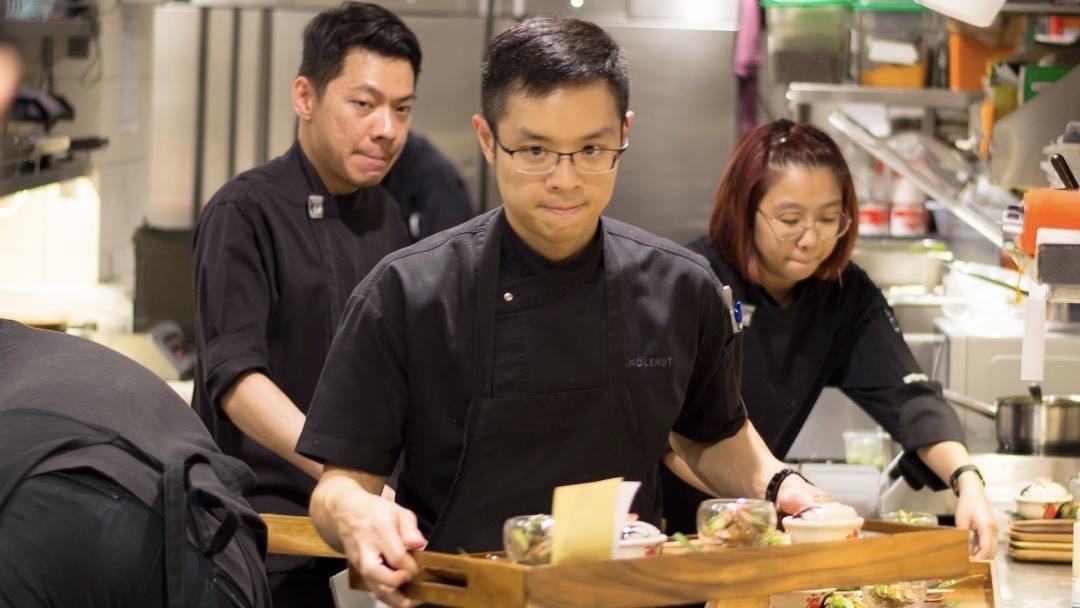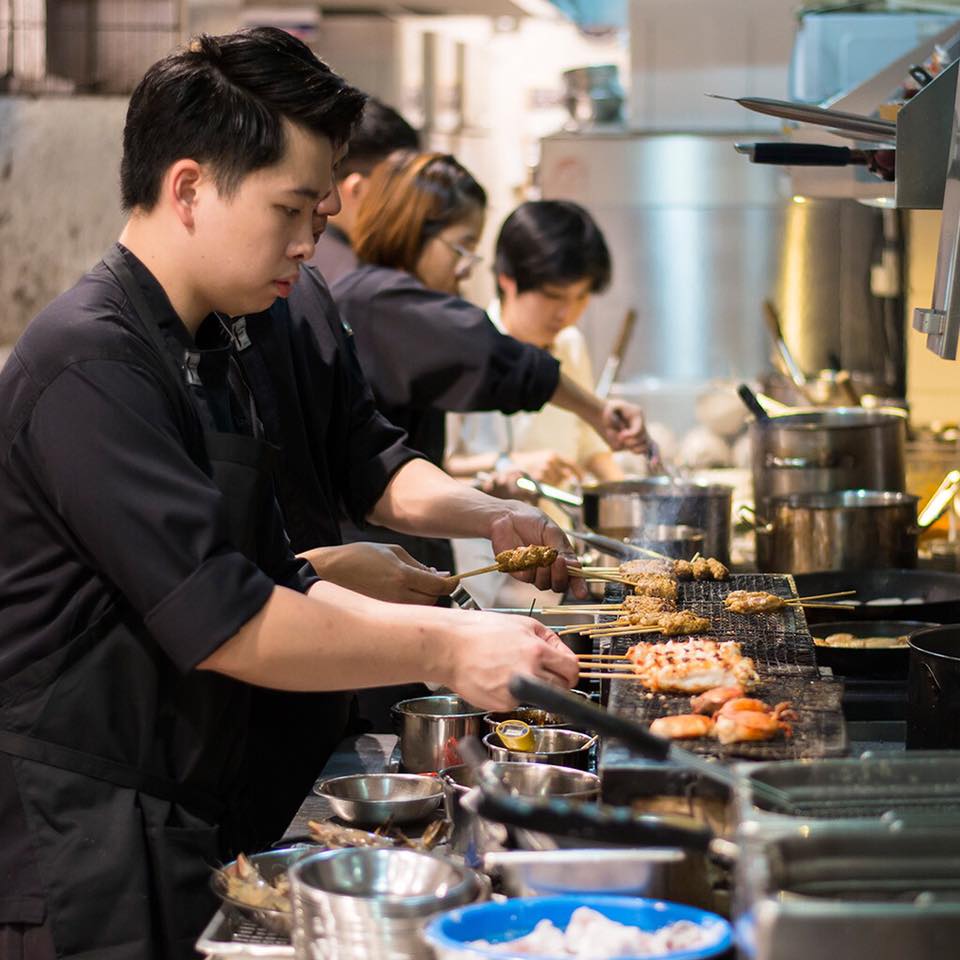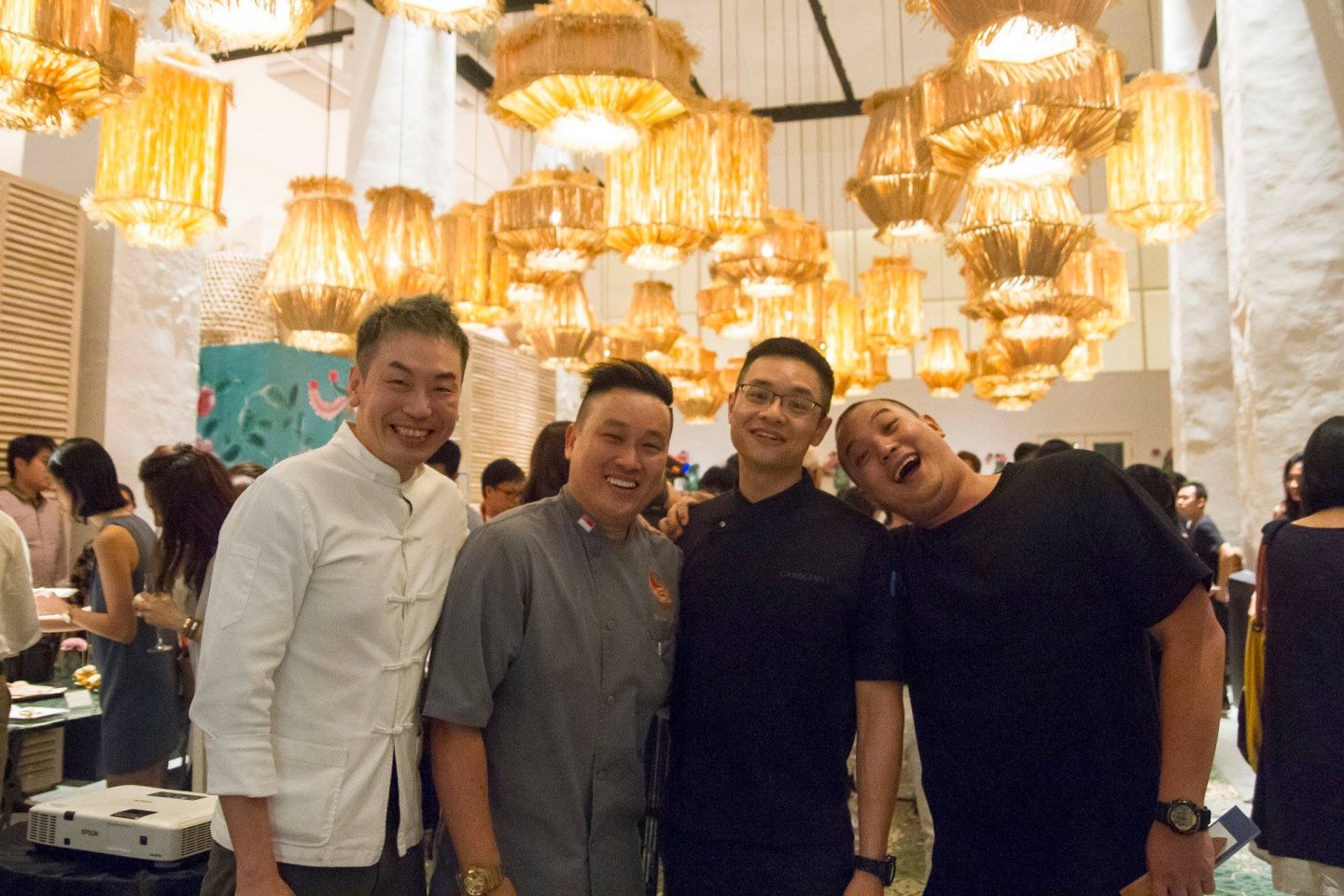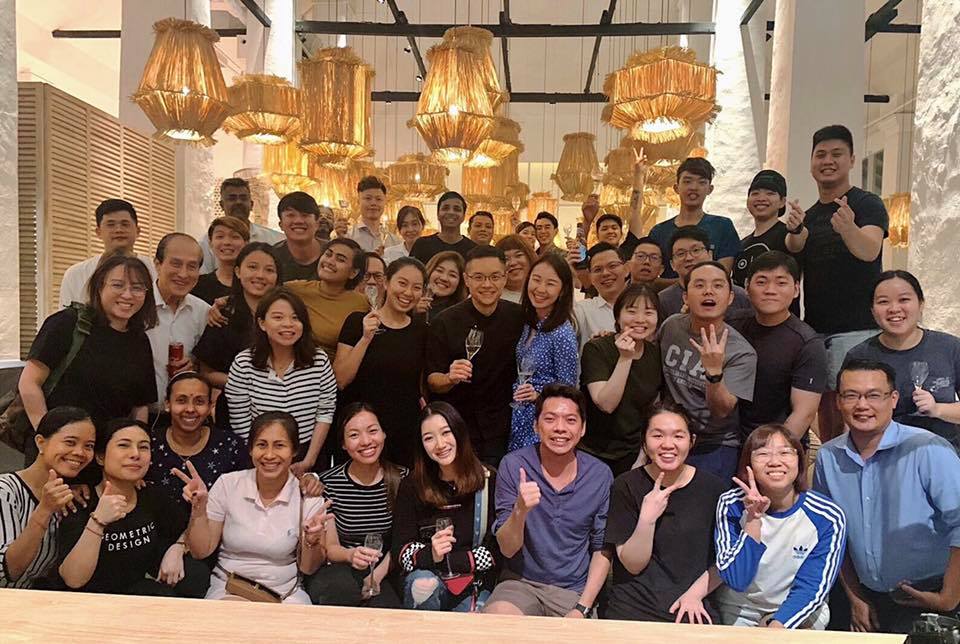Malcolm Lee’s Michelin secret: God’s in the kitchen at Candlenut
by Geraldine Tan // January 30, 2020, 6:00 am

“The restaurant is not about the awards, it is about people. It should be about making people happy,” says Candlenut's Malcolm Lee (centre). All photos from Candlenut's Facebook page.
A bout of depression so defined his future’s path that Malcolm Lee openly shares what would otherwise be a closely guarded secret for lesser men.
The head chef and founder of Candlenut, the world’s only Michelin-starred Peranakan restaurant, Lee is candid about how his long hours took a heavy toll on him and his relationships.
“I was working so much that I was neglecting time with God, my family, friends, cell group, loved ones,” the 35-year-old says. “I lost a lot of things to reach here.”
“Here” is now the fourth year that Candlenut has achieved Michelin star status. It’s a height he attributes to his support network of family, church friends and colleagues who rallied around him during that dark season of melancholy.
“How am I impacting their lives? How can I reflect Christ in Candlenut?”
“God sent all these people around me to make sure I was okay. Even though I was not in the right state of mind, they kept encouraging me.”
Their loving words and actions redirected him back to God and prompted the questions: “What is Your plan and purposes for me? Why did you place me here?”
The answer was rooted in a reflection on his beginnings. The reason Lee wanted to be a chef in the first place was, primarily, for people – the myriad variety of people he would come into contact with, both staff and guests, at his restaurant.
It set him thinking: “How am I impacting their lives? How can I reflect Christ in Candlenut?”
As he sought God, it became clear that he was to change his restaurant’s culture – unthinkable though the move might be, by industry standards (1 Corinthians 1:27).
Getting a life
At the top of Lee’s list was work-life balance. His staff worked six days a week, sometimes at a stretch of more than 14 hours per day. The physical demands of manning the kitchen meant that many of them just slept in on their rest day, instead of spending time with their family and friends – a job hazard Lee was all too familiar with.
Food and beverage (F&B) industry workers hardly see their loved ones and vice versa, and this is fuel for much misunderstanding especially between couples.

F&B staff cook up as much of a storm at home because of their long working hours. Hence, Malcolm Lee’s efforts to make sure Candlenut’s people have time for their families.
“This is very common and that is usually why F&B staff are very frustrated. It is not them but the environment they are in. So, as a boss, I need to change the environment.”
“It is not them but the environment they are in. So, as a boss, I need to change the environment.”
He reorganised the work week to give his staff at least two days off, even though it translated immediately into a 20 to 25% loss in manpower.
“It was painful to execute,” reflects Lee, who gave his staff priority ahead of himself and spent “many hours” shaping the system. “For me to enjoy this, I need to make sure my team has it first.”
Another change he implemented was a transparent pay and leave structure, which ensures his staff are compensated when they work overtime – this, in an industry notorious for short-changing its workers their fair dues.
Also, no one was to contact those on leave unless absolutely necessary. Establishing this boundary was important to Lee, as it was akin to keeping the Sabbath (Exodus 20:8-11).
Cleaning up
Besides long hours and unfair practices, restaurant kitchens are known to be toxic places where unkind words and vulgarities can sometimes lead to fights.
Lee pronounced a ban on vulgar language in Candlenut’s kitchen, encouraging his staff instead to speak nicely to one another to resolve issues (Proverbs 12:18, 15:1).
“Some of my staff think I’m crazy,” he laughs. “It has taken a long time to instil this habit of speaking kindly to one another. It is only possible when one has pure intentions – sincerity, love – for others.”
This Biblical tenet extends to managing errant staff too. Lee describes: “If someone has issues, most bosses/managers/sous chefs go: ‘Why you so slow?! Even my grandmother works faster than you!’ ”
“So we sit them down, talk to them … because we don’t know what the person is going through.”
But not at Candlenut. “You can come in love, patience, kindness, goodness, gentleness,” says Lee, citing the fruit of the Spirit (Galatians 5:22-23).
“So we sit them down, talk to them. Some of them cannot see why I always do this, but it helps because we don’t know what the person is going through. Maybe he’s got some injury or some problem? We need to understand.”
Lee also leaves encouraging words and Bible verses on the kitchen’s schedule as his little way of ministering to his staff.
“I write little notes for them too, like how my church friends always write them for me. Sometimes my staff find it quite funny, why I would write little notes for them,” he chortles. “These notes take a lot of time leh.”
He has also told his staff: “Anything, just tell me. If you have any problem, just tell me” – because he sees himself as not just their boss, but as their mentor and family too.
It’s his way of loving his people like Christ loves the Church.
Hearty aroma
Many of his staff have told him that they have never worked in a restaurant environment like his, where staff take care of and support each other like a big family and iron out issues calmly.
Even guest chefs have asked: “How come it is so different in your kitchen?”

Good food is better with great friends: Flanking Malcolm Lee are (left to right) Willin Low of Wild Rocket, Wayne Liew of KEK Seafood and Andrei Soen of Park Bench Deli, who took part in Candlenut’s “8 years, 8 Hands” anniversary dinner on April 11, 2018.
Lee’s take: “When you enter a kitchen, you can sense the energy. If it is toxic, you can feel its tiredness, its frustration. And conversely, you can feel a bright kitchen as well. You can see it on people’s faces, the energy, the way they talk to you.
“I wouldn’t have been able to change it without God’s principles.”
“I think we have that and people can sense it. And then I get opportunity to share the whole story of why I’m changing the culture in Candlenut, how it changes the staff’s mentality and what I’m basing my decisions on.”
Turning the prevalent restaurant culture on its head required sacrifices and a dying to self for Lee. “It is very hard. Candlenut’s doing what restaurants are supposed to and more.
“I wouldn’t have been able to change it without God’s principles.”
Scripture guides how he runs the restaurant – something, he readily admits, he is still in the midst of learning and implementing.
At the end of the day, Candlenut is less about its Michelin-star distinction and all about the lives that it gets to touch.

Under one roof: Malcolm Lee and his Candlenut family celebrating the restaurant winning a Michelin star for the fourth year running.
“How do you cook good food for people? When your staff is happy to work here and your loved ones happy to support you, this naturally translates into better food and service, which leads to happy guests.
“When these click, it is beautiful,” Lee smiles.
“The restaurant is not about the awards, it is about people. It should be about making people happy.”
Candlenut’s Malcolm Lee was on brink of hanging up his apron before his Michelin star
We are an independent, non-profit organisation that relies on the generosity of our readers, such as yourself, to continue serving the kingdom. Every dollar donated goes directly back into our editorial coverage.
Would you consider partnering with us in our kingdom work by supporting us financially, either as a one-off donation, or a recurring pledge?
Support Salt&Light


